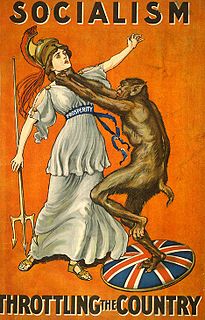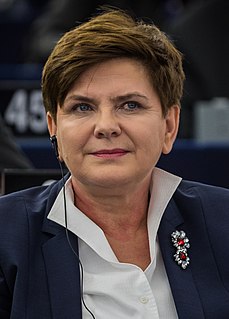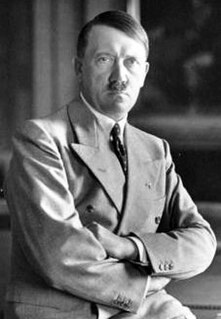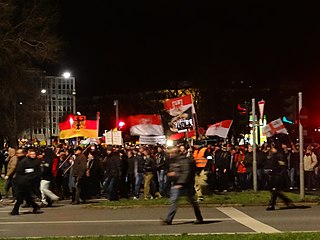Related Research Articles

Left-wing politics support social equality and egalitarianism, often in opposition of social hierarchy. Left-wing politics typically involve a concern for those in society whom its adherents perceive as disadvantaged relative to others as well as a belief that there are unjustified inequalities that need to be reduced or abolished. According to emeritus professor of economics Barry Clark, left-wing supporters "claim that human development flourishes when individuals engage in cooperative, mutually respectful relations that can thrive only when excessive differences in status, power, and wealth are eliminated."
The Pim Fortuyn List was a political party in the Netherlands named after its eponymous founder Pim Fortuyn, a former university professor and political columnist. The party was considered populist, right-wing populist and nationalist as well as adhering to its own distinct ideology of Fortuynism according to some commentators.

Right-wing politics is generally defined by support of the view that certain social orders and hierarchies are inevitable, natural, normal, or desirable, typically supporting this position on the basis of natural law, economics, or tradition. Hierarchy and inequality may be seen as natural results of traditional social differences or competition in market economies. Right-wing politics are considered the counterpart to left-wing politics, and the left–right political spectrum is one of the most widely accepted political spectrums.
Far-right politics, also referred to as the extreme right or right-wing extremism, are politics further on the right of the left–right political spectrum than the standard political right, particularly in terms of being anti-communist, authoritarian, ultranationalist, and having nativist ideologies and tendencies.
The left–right political spectrum is a system of classifying political positions characteristic of left-right politics, ideologies and parties with emphasis placed on issues of social equality and social hierarchy. In addition to positions on the left and on the right, there are centrists or moderates who are not strongly aligned with either end of the spectrum. There are those who view the left-right political spectrum as overly simplistic, and who reject this method of classifying political stands, suggesting instead some other system, such as a two-dimensional rather than a one-dimensional description.

The Centre Democrats was a political party in the Netherlands. Founded in 1984 by members who split out from the Centre Party (CP), the Centre Democrats was joined one month later by the only CP Member of Parliament—Hans Janmaat. Janmaat went on to become the leader of the party, which subsequently became strongly centered on his person. The newly formed Centre Democrats represented the more moderate faction of the Centre Party, but espoused an anti-immigration and nationalist ideology. Their claims of standing in the centre of the political landscape have thus been disputed by political scientists.
New Democracy was a political party in Sweden. It was founded in 1991 and elected into the Riksdag in the 1991 Swedish general election. It lost all its seats in the Riksdag in the subsequent election in 1994, and its subsequent decline culminated in bankruptcy in February 2000, at which time it retained only one city council post. Local factions of New Democracy reformed into minor parties such as Sjöbopartiet, which faced mixed success.
Right-wing populism, also called national populism and right-wing nationalism, is a political ideology which combines right-wing politics and populist rhetoric and themes. Like left-wing populism, it employs anti-elitist sentiments, opposition to the Establishment, and speaking to or for the "common people". However, populists of the right generally focus on cultural issues, often aim to defend a national culture and identity against perceived attacks by outsiders, whereas left-wing populists more frequently employ economic arguments and attack neoliberalism and the role of large corporations in society.

In political science and sociology, a cleavage is a historically determined social or cultural line which divides citizens within a society into groups with differing political interests, resulting in political conflict among these groups. Social or cultural cleavages thus become political cleavages once they get politicized as such. Cleavage theory accordingly argues that political cleavages predominantly determine a country's party system as well as the individual voting behavior of citizens, dividing them into voting blocs. It is distinct from other common political theories on voting behavior in the sense that it focuses on aggregate and structural patterns instead of individual voting behaviors.
Emil Schlee was a German historian and politician with the CDU and REP. He was born in Schwerin and died in Schwentinental.

Welfare chauvinism or welfare state nationalism is the political notion that welfare benefits should be restricted to certain groups, particularly to the natives of a country as opposed to immigrants. It is used as an argumentation strategy by right-wing populist parties, which describes a claimed connection between the problems of the welfare state and, in essence, immigration, but also other social groups such as welfare recipients and the unemployed. The focus is placed on categorizing state residents in two extremes: the "nourishing" and "debilitating" and the contradiction between them in the competition for the society's scarce resources.

Parliamentary elections to both the Sejm and Senate were held in Poland on 25 October 2015 for the eighth term of the Sejm of the Republic of Poland, which ran from 12 November 2015 until 2019.
The ethnic competition thesis, also known as ethnic competition theory or ethnic competition hypothesis, is an academic theory that posits that individuals support far-right political parties because they wish to reduce competition from immigrants over scarce resources such as jobs, housing and welfare benefits. According to the theory, support for the far right should be higher in areas if there are more immigrants and more lower-educated and lower-skilled voters who would face competition from them.
Jens Rydgren is a Swedish writer, political commentator and a professor of sociology, at Stockholm University. Specialising in research of political sociology, for many years he has studied populist right-wing parties. In 2002 he defended his thesis Political Protest and Ethno-Nationalist Mobilization: The Case of the French National Front in a debate with Sidney Tarrow of Cornell University. He has appeared as an expert on right wing populist parties, including the Sweden Democrats, in various news media.

The social breakdown thesis is a theory that posits that individuals that are socially isolated — living in atomized, socially disintegrated societies — are particularly likely to support right-wing populist parties.
Hans-Georg Betz is an academic at the University of Zurich. He is the author of several books on right-wing populism including Radical Right-Wing Populism in Western Europe and The New Politics of the Right: Neo-Populist Parties and Movements in Established Democracies.

In political science, the terms radical right and populist right have been used to refer to the range of European far-right parties that have grown in support since the late 1970s. Populist right wing groups have shared a number of causes, which typically include opposition to globalisation and immigration, criticism of multiculturalism, and opposition to the European Union.
Europe of 100 Flags is a concept developed by Breton nationalist Yann Fouéré in his 1968 book, L'Europe aux Cent Drapeaux. It proposes a redrawing of European borders in a way that more resembles a map of the region during the Middle Ages, including the creation of states for Basques, Bretons, and Flemings. These regions would be designed to promote regionalism and European federalism as a replacement for nationalism, and redefine extreme European boundaries more strictly in terms of ethnically homogeneous "authentic" historic regions. These individually ethnically "pure" states would then be incorporated under a "post-liberal-pan-European framework".
During the 1990s New Zealand saw a growth in populism, a political trend whose advocates claim to work for "the people" rather than for the "elite". The rise of populism in the country has been attributed to the introduction of the mixed-member proportional electoral system, as well as to the populist nature of election campaigns, such as that of the Labour Party in the lead-up to the 1999 election. The New Zealand First party, which has historically taken a nationalist standpoint, has been described as a populist party.
The politics of resentment, sometimes called grievance politics, is a form of politics which is based on resentment of some other group of people.
References
- ↑ Bäckman, Malin (2013). Losers of modernization or modernization winners? (PDF). Gothenburg University Publications Electronic Archive. Archived from the original (PDF) on 2 April 2015.
- ↑ Betz, Hans-Georg (1994). Radical right-wing populism in Western Europe . New York: St. Martin's Press. ISBN 9780312121952.
- ↑ Rydgren, Jens; Ruth, Patrick (September 2011). "Voting for the radical right in Swedish municipalities: social marginality and ethnic competition?". Scandinavian Political Studies . 34 (3): 206. doi:10.1111/j.1467-9477.2011.00269.x.